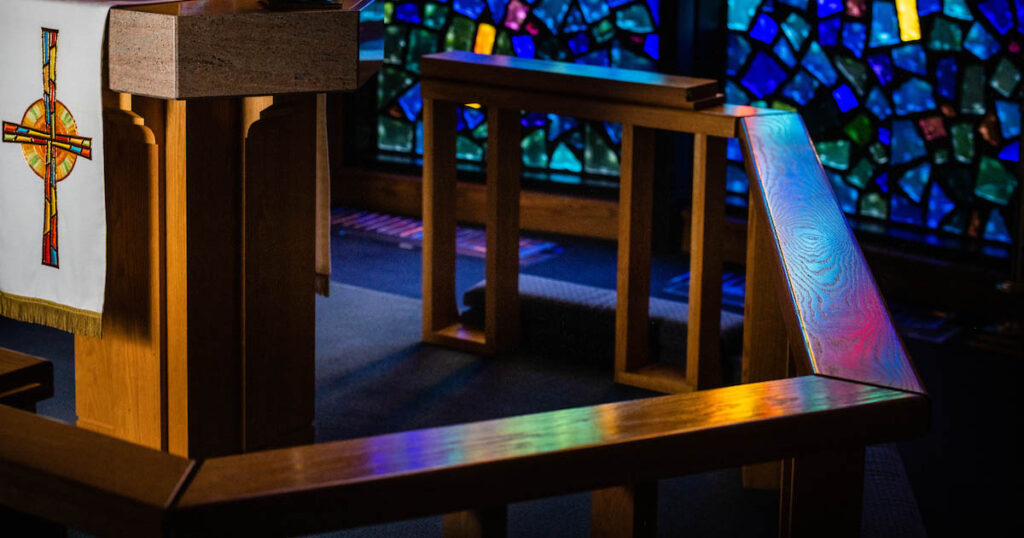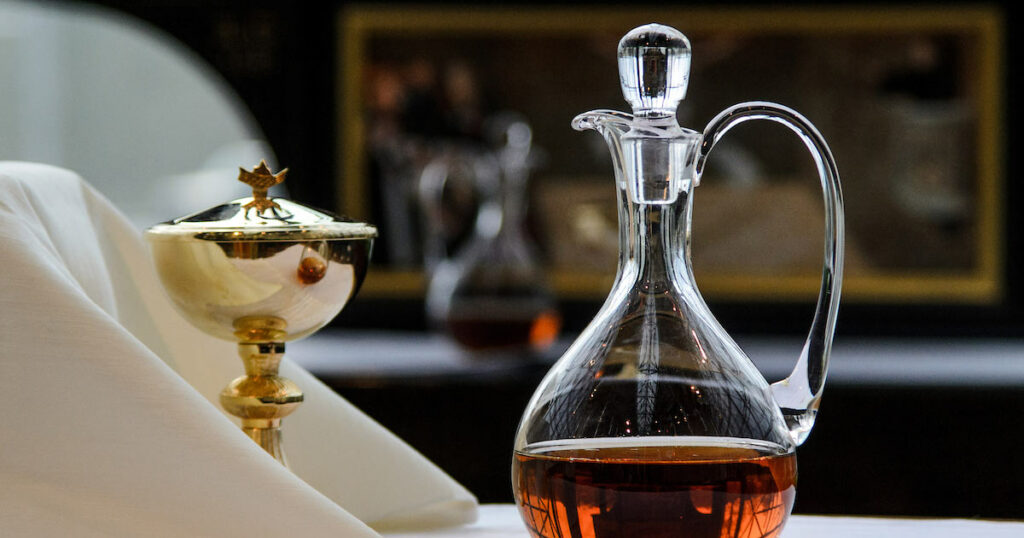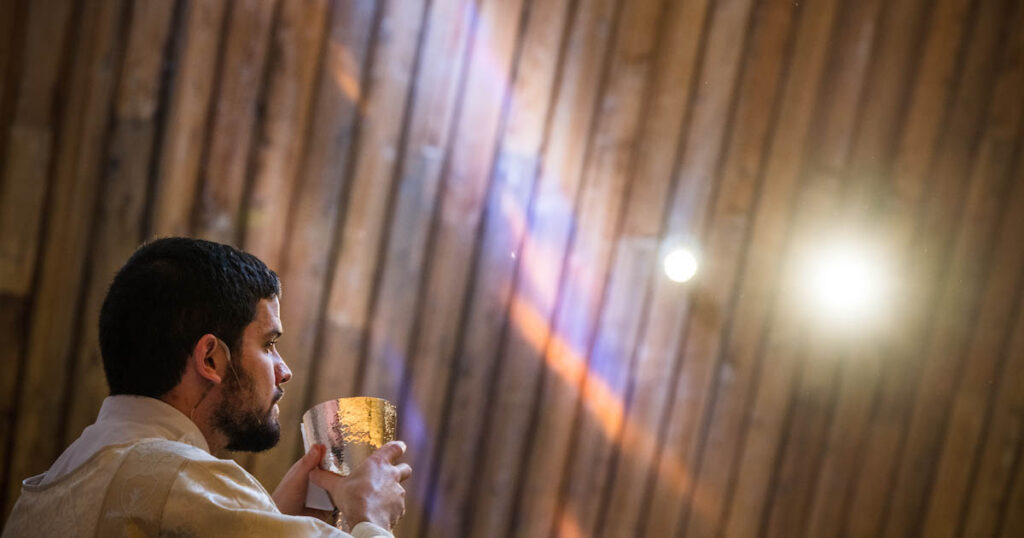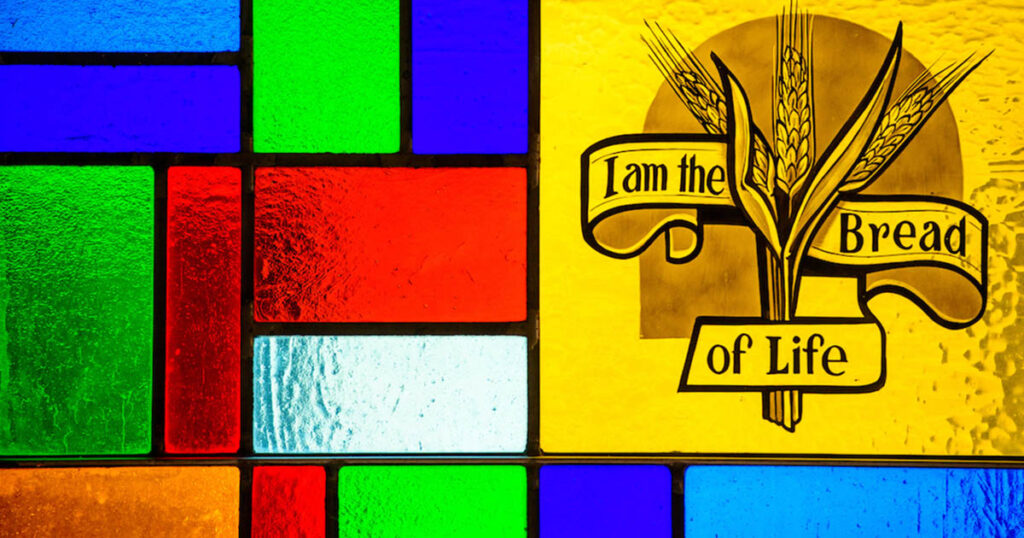4. Is Weekly Communion Too Common?
In Easter season 1999, I surveyed all LCMS pastors regarding weekly communion. Their members largely feared that weekly communion would make the Sacrament “too common.” This perspective grows out of the infrequent use of the full Divine Service in the history of The Lutheran Church—Missouri Synod (LCMS).
LCMS communing statistics first appear in 1930 and report an average communion of 2.10 times a year per member. At that time, most congregations offered Communion four to six times a year. In 1950, 1970 and 1990, LCMS members communed on average 3.22, 5.91 and 8.44 times per year. Through these decades, most congregations increased offering the full Divine Service to at least twice a month. Many now also add the fifth Sunday and feast days.
In view of the significant absence of Holy Communion through these decades, the “too common” objection is quite predictable. Additionally, this sentiment is nearly guaranteed when the Sacrament is mistakenly understood as our work.
God’s work
Recall that Dr. Luther described as fanatical the perspective that views the Lord’s Supper as our work (LC V 7). Helpful and revealing questions about the Sacrament being “too common” should therefore be asked with Jesus as the subject, not us. “Does Jesus serving us His body and blood each week make it ordinary?” “Is anything ever common that our Lord Jesus Christ comes to do for us?”
Consider how people responded to Jesus’ deeds in Scripture. They did not view His healings and other miracles as common. They sought Him for more. People in the presence of Jesus did not view His feeding with earthly food as common. He fed 5,000 with the normal fare of daily diets. Yet “they were about to come and take him by force to make him king” (John 6:15). When Jesus withdrew, they pursued Him like a runaway vending machine. They hungered for more of His miracles. They would have joyfully received a greater frequency of His giving of daily bread.
Jesus warned them about their faulty hunger for bread that perishes: “You are seeking me, not because you saw signs, but because you ate your fill of the loaves. Do not work for the food that perishes, but for the food that endures to eternal life, which the Son of Man will give to you” (John 6:26–27). The ascended Lord does not serve perishable food to His church today. What Jesus bestowed as the New Testament in His blood is holy food. This is forgiveness food and totally uncommon. This food is a miracle, a mighty work of the Son of God.
Greatest work and great work
On the night He gave the New Testament in His blood, Jesus said to His disciples, “Truly, truly, I say to you, whoever believes in me will also do the works that I do; and greater works than these will he do, because I am going to the Father’” (John 14:12). Jesus went to the Father by means of the greatest work of all — His crucifixion, resurrection and ascension. The greater works of Christ’s apostles and church came from Christ’s authority and by means of His sending the Holy Spirit (John 15:26–27; 16:7–14). Jesus said of the Spirit, “He will glorify me, for he will take what is mine and declare it to you” (John 16:14).
There were great miracles of healing done through the apostles in the days following Pentecost (Acts 5:12–16). These greater works magnify Jesus’ presence in the proclamation of His Gospel throughout the world. In these last days, His presence is no longer limited to His geographical location as during His three years of visible earthly ministry. Through the public preaching of Christ’s called servants and through Christians’ witness in their vocations, the great work of conversion has gone into all the world. So also, the greater works Jesus spoke of include the Holy Sacraments by which He promised eternal blessing. In these end times, Jesus’ greater works flow directly from His greatest work (Heb. 10:19–22). They include His Sacraments carried forth through His sent ones after His ascension.
On Easter Eve, the risen Christ sent His apostles to bestow the greater work of absolution (John 20:23). Before His ascension, He sent them to bestow the greater work of Holy Baptism (Matt. 28:16–20). Luther called this work of God an unspeakable treasure. The apostles proclaimed its miraculous power as a washing for the forgiveness of sins (Acts 2:38), a gift that clothes one with Christ (Gal. 3:27), a gift that saves you (1 Peter 3:21) and a washing of rebirth (Titus 3:4–7). This gift directly connects the baptized to the central miracle of human history, the sacrificial death and the resurrection of the Son of God (Rom. 6:1–11). Nothing can make Holy Baptism common. Only a sinful disregard and dullness treats Baptism as common. Daily remembering and depending upon it makes it less common, not more.
Not a common gift
So also with the Lord’s Supper. The Holy Spirit led the infant church in devotion to this gift and to God’s Holy Word (Acts 2:42). There is nothing common about the Lord’s Supper. Jesus’ words of giving His body and bread, blood and wine, are what Dr. Luther called the sum and substance of the Gospel. He also said, “the entire Gospel and the article of the Creed — I believe in … the holy Christian Church … the forgiveness of sins, and so on — are embodied by the Word in this Sacrament and presented to us” (LC V 32). God holds nothing in reserve as His Son gives us His flesh and blood.
Sometimes, weekly worship and the weekly sermon may feel ordinary. The default setting of our sinful hearts treats God’s gifts as ordinary. The solution is not to let Jesus speak to us less or to gather the church less frequently (Heb. 10:24–25). The solution is repentance, turning from our work to Christ’s work in love for us.
“Seek the Lord and his strength; seek his presence continually! Remember the wondrous works that he has done, his miracles, and the judgments he uttered” (Psalm 105:4–5). The strength of the miracle of the Sacrament of the Altar is the judgment God uttered on the altar of the cross. He condemned His Son and redeemed us. In the Lord’s Supper, the crucified and risen Christ continues entering the world through His church with the fruits of His once-for-all sacrifice. This meeting of heaven with earth in the flesh of Jesus is so very uncommon (LSB 639:3).
Uncommon work, food, peace
At His altar, He does the uncommon work of a blessed exchange. As we sing, “All that you are we here receive, And all we are to You we give” (LSB 623:3). He exchanges His perfection for our sin, His righteousness for our unrighteousness. This is justification fully expressed. There is nothing more freeing and joy-filled for the week ahead.
At His Table, the Good Shepherd makes us to lie down in green pastures. His uncommon food satisfies those who hunger and thirst for righteousness. As we sing, “To pastures green, Lord, safely guide … Your table well for me provide” (LSB 625:2), and “The gifts that You have given Have filled my heart with rest” (LSB 642:1). At His Table, our Good Shepherd provides the greatest rest and refreshment for the week ahead.
At His altar, Jesus gives us uncommon peace, peace the world cannot give. Jesus gives objective, outside-of-us peace with God. In Christ, God is at peace with you whether you feel it or not. As we sing, “O taste and see — the Lord is peace” (LSB 629:1), indeed, “Peace beyond all understanding” (LSB 636:5). The refuge of God’s peace in the Sacrament provides for the pressures of the coming week.
Food for dying
In His Supper, Jesus serves life-giving food that surpasses death. As we sing, “Where the paschal blood is poured, Death’s dread angel sheathes the sword” (LSB 633:3). “For You have freely given What earth could never buy, The bread of life from heaven, That now I shall not die” (LSB 642:2). “This food can death destroy” (LSB 642:3).
I have heard of members who expressed to their pastors: “If I knew I were going to die soon, I would want Holy Communion at least every week, perhaps even daily.” We are not promised tomorrow on earth, but now is the day of salvation. We are promised eternity with our Savior who comes to us on earth to prepare us body and soul for the new heavens and the new earth. God grant us to hunger and thirst for Jesus’ food that does not perish just as the crowd of 5000 pursued Jesus for earthly food.






I’m puzzled by the comment that the “too common….sentiment is nearly guaranteed when the Sacrament is mistakenly understood as our work.” In my discussion with elderly members who felt uncomfortable with every Sunday communion they never said communion was common. They cherished it as the body and blood given for them. Their fear was that communion would become a thing of obligation like the days before the reformation. It’s an honest concern. The circumstances are similar to Luther introducing communion in both kinds. It was the scriptural thing to do but he didn’t want to make it just another ceremonial requirement so he recommended to preach the words of Jesus until the lay people demanded to take wine & bread. Let’s clearly proclaim the truths given by Rev. Wilting but respect our brothers who are also concerned about the Lord’s Supper being a thing of work rather than grace.
At my grandparents WELS congregation, a person had to speak personally with the pastor during the week before a service if they wanted to commune. The communion service was a separate service held after the regular Sunday service and after the sanctuary had been emptied. The elder would then stand at the entrance to the sanctuary with a list from the pastor and only those people approved by the pastor could enter the sanctuary for Communion. The reason given for the practice was that Holy Communion was a very serious thing and the pastor had the responsibility to make sure a person’s heart and mind were properly prepared to receive the Sacrament and not risk the welfare of their very soul. It also ment that some members went for months/ years without taking Communion. The receiving of the Sacrament is a very serious thing and should not taken carelessly or lightly. On the other hand, it should be given and celebrated by everyone in the assembled congregation without unnecessary barriers.
Part of the issue is also how we teach our reception on either side of the debate. When we teach that the Holy Supper is of supreme importance and thus we “must” observe it weekly, we are turning it into a work. It needs to be taught as we do any other “good work”, that it is simply our response to the grace of God – and there is no other more filling mode of God’s grace than in the sacraments. We ought not force our people to observe it weekly, but rather with right teaching over time they will desire to have it every week.
Rev. Bolosan,
Greetings. The author is not requiring everyone to receive the Lord’s Supper. It’s not a law in that regard. However, if we refuse to offer it, then we are making it a law. We are refusing to give it to those who desire it. We are telling them, “You don’t get to have this gift right now.” That’s a much more problematic instance of the Law than weekly offering the opportunity to receive the forgiveness and grace that our Lord won for us to those who desire it.
Amen, Amen. The lutheran churches who refuse to give communion when the Word is rightly preached (several times a week) are suffering from the unbelief that it does as Jesus said it would. Hence why I attend the Lutheran historical liturgical church I do now is because they will give it several times a week. I’d take it daily if it was offered and I lived closer to the church.
I am blessed to have joined a congregation which formed 20 years ago in an urban location with a specific goal to offer communion at every service every Sunday. We have good regular attendance, no problems paying bills, a happy pastor who leads us also in confessional and liturgical worship, and we are growing. When the Lord feeds His people, He gives us a taste of heaven itself and we mature in that blessing.
I am not opposed to receiving Holly Communion every week or everyday or every hour. Is being practical or reasonable a worthy concern? In my casual study I noticed that most orthodox theologians suggested that it should be received frequently without specifying just what that meant. Walther suggested that a fortnight might be frequent enough, although weekly might be better.
I am more concerned about “high church” pastors whose self-righteousness about worship practices drives people away from worship.
I’ve yet to meet a Lutheran who cites “Self-righteousness about worship practices” as a reason for their departure from the church.
I disagree. It is definitely happening today. “Self-righteousness” in High Church ministers have, and continue to use communion to punish and divide parishioners. The use of communion to shame and shun, is at least part of the reason people leave the church.
This is happening.
Amen!
First let me thank Pastor Wieting on his superb articles on weekly communion, an important topic that was neglected for too long in our church. But as I read through the comments from the first four articles it seems to me that some are misunderstanding what Pastor Wieting is saying. As I see it one of Pastor Wieting’s main points is that Jesus is coming to serve us in the Sacrament — that it’s not about our doing but Christ’s doing for us. Yes, there are abuses and unkind words and actions from proponents on both sides of the argument, as there are in most arguments. But it’s important not to get distracted by these side issues. The question is: Is Jesus Jesus coming to serve us with a great and necessary treasures in the Sacrament? If the answer is yes, which I believe it is, then we need to ask who gets to decide how often we need the Sacrament: the Pastor, the elders, 51 to 49% of the vote at a Voter’s meeting? That seems to me to be the legalistic approach, at least from the perspective of those on the losing side of the issue.
That answer, of course, is that Christ decides. Hasn’t He made clear His decision by virtue of what He offers us in the Sacrament? I’ve never heard anyone ask that we only have a sermon or the Lessons on the first and third Sundays of the month. We know that God’s Word is too important to our faith for that. Is the Communion less important? How do we know which Sundays people will or will not have need for the Sacrament? I believe that’s a more Gospel determinative approach.
I haven’t seen anything in Pastor Wieting’s articles that implies that we should force people to receive communion or judge people for not attending. That, of course, would be wrong. We are given the freedom of not attending on a given Sunday. But for the sake of our of our neighbor who feels a deep need it is best we allow Christ to serve us with all His gifts as He desires.
Thank you Pastor Gallo for helping one focus on the real issue, that Rev. Dr. Wieting is trying to promote, namely that Christ is giving us His blood-bought treasure in the Sacrament of the Altar.
I love this response Rev Gallo and I thank you for it. I especially love the reminder that our freedoms and the ability to choose come from God in the gift of His Son. One is free to partake in the gift of communion and the wonderous reminder that God’s sacrificial gift has freed us from sin, death and the devil. Hallelujah! May it be so, for Jesus’ sake!
There is a growing underlying sense of self-righteousness and judgement of anything other than every Sunday communion growing among some pastors and elements of our church. I’ve even heard an elder proclaim the Gospel proclaimed is not sufficient without the sacrament of communion. There is the sense that “you are doing it wrong” in too many of these communications. I even know a church where a young firebrand pastor came in as associate and managed to run off the senior pastor who wasn’t moving fast enough on this for him. No matter that 1/3 of the church left, they now have communion every Sunday.
Sorry to here that.
Sorry that happened.
Perhaps the Assoc Pastor,needs more training.
It sounds like they might,by the tone of your comments.
Clergy needs to be be careful,not to drive people away.
I will keep the young Pastor,in my prayers and the church,were that happened.
Early on the Supper was daily! Why? Because it was not instrumental to something else, like strengthened faith, but was itself a participation in the End. Beyond such a communion there was nothing more. How could there be? It is the communion in the body and blood of God the Son!